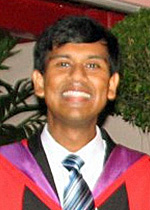Montegut Scholars: Shastri Motilal and Patrick O'Donnell
The Montegut Global Scholars Program (MGSP) was established by the American Board of Family Medicine Foundation (ABFM-F) in 2010. The MGSP was established to foster international education, research and collaboration, in the specialty of family medicine. It supports the attendance of one family physician from each of the seven regions of the international organisation of family physicians (WONCA) to their regional meetings or to the international meeting in the year when it is held.
In 2016 The MGSP will provide a USD3,250 scholarship for the selectee from each region to attend the WONCA world conference, in Rio, in 2016. More information
here
Recently two scholars have submitted their reports.
Dr Shastri Motilal of Trinidad

Dr Shastri Motilal BSc (Hons), MBBS (Hons), DM Fam-Med, from Trinidad, is the WONCA North America region (Caribbean College of Family Physicians) Montegut Scholar for 2015.
He is also the coordinator chosen by the CCFP for our Caribbean Polaris Group, the group of young and new family doctors that practice in the non-Spanish speaking Caribbean. He is an Honours graduate of our local University of the West Indies, having completed the DM in Family Medicine.
Shastri participated in both the WONCA Polaris preconference and the AAFP Global Health Conference held in Denver, Colorado in October 2015. His report lists his action points emerging out of participation:
1) To continue my collaboration with Polaris as the Caribbean representative focusing on ways of how to improve the image of family medicine in my setting. I plan to share information about FM and our young doctor’s group, with all my undergraduate medical students as well as my postgraduate students involved in general practice.
2) To liaise online with the people I met at the FM Changemakers session to maintain links and keep our ideas going about how we can improve the image of family medicine
3) To contact key persons at the Canadian College concerning their alternate route to certification to get further details on how their process works. I will serve as a liaison with my local college accreditation committee, giving input on how we can set up certification appropriate for our setting
4) To propose to colleagues and other local academics the idea of using the Primary Care Assessment Tool in the Trinidadian setting, with the hope of such results being shared with the Ministry of Health and other stakeholders.
Shastri says to the ABFM "
I wish to again thank you for affording me the opportunity of attending this conference. It was an amazing experience meeting so many other Family Physicians and I know I have forged links that would last a lifetime. The information I gained from this conference would not only benefit me but also my patients, my students in training and the overall development of Family Medicine my region."
Read Shastri's full report
Dr Patrick O' Donnell, Ireland

Dr Patrick O’Donnell is Clinical Fellow in Social Inclusion, Gradate Entry Medical School, at the University of Limerick in Limerick, Ireland. Patrick is the WONCA Europe Montegut Scholar for 2015. He recently returned from the WONCA Europe conference in Istanbul, Turkey. He writes "
I would describe the five days that I spent at the conference as inspiring, invigorating and definitely hectic. I had set myself the goal of trying to attend as many sessions as possible that would help me with my teaching, research and clinical work in the future."
His report lists his action points emerging out of participation:
- I have already written a blog for the Canadian Medical Association Journal on the Istanbul refugee health statement and its relevance to family medicine in Europe and beyond. At present countries like Canada and Australia are seeing debates nationally as to whether their health systems would be able to support many refugees with health needs. Having a statement of intent like this one form WONCA Europe can lead the way and encourage other regions to make similar declarations.
- I have disseminated the statement in my medical school and I have begun discussion on how we can train medical students and GPs better to care for these newly arriving refugees. Topics such as cultural competence, unfamiliar illnesses and working with interpreters would all be relevant in this regard. I hope to incorporate some of these in to my teaching sessions in the coming months.
- I have decided I would like to become more involved in my own national GP organisation. I understand on a case by case basis we can make a difference for the patients we meet in clinic, but by looking at issues nationally and internationally we can make a difference for many patients. One powerful tool we have in GP is day to day contact with and detailed knowledge of the world our patients live in. We need to be able to identify the problems that our patients face and effectively research these to be able to better advocate on their behalf.
- I have decided I will engage in research on migrant and refugee health in my own country, and potentially across Europe. With that I intend to apply for the Vasco da Gama Junior Researcher Award in 2016.
Patrick adds "I would like to thank the American Board of Family Medicine Foundation’s Montegut Global Scholars Program for giving me the opportunity to attend the WONCA Europe conference 2015."
Read Patrick's full report